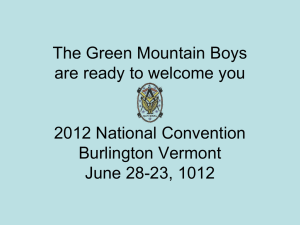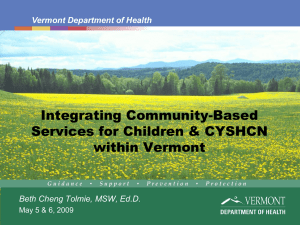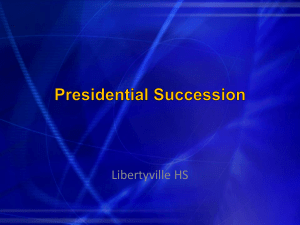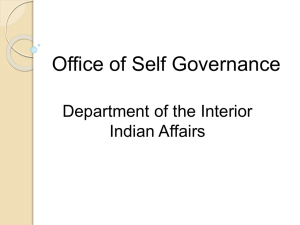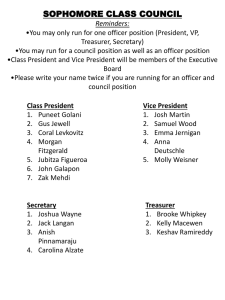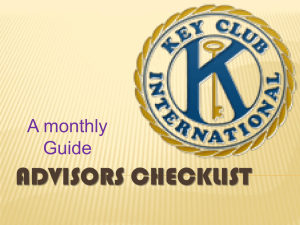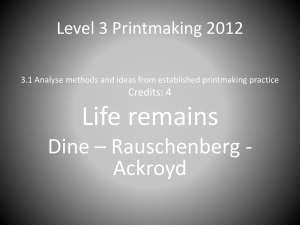Vermont Secretary of State Jim Condos What is a “meeting”?
advertisement
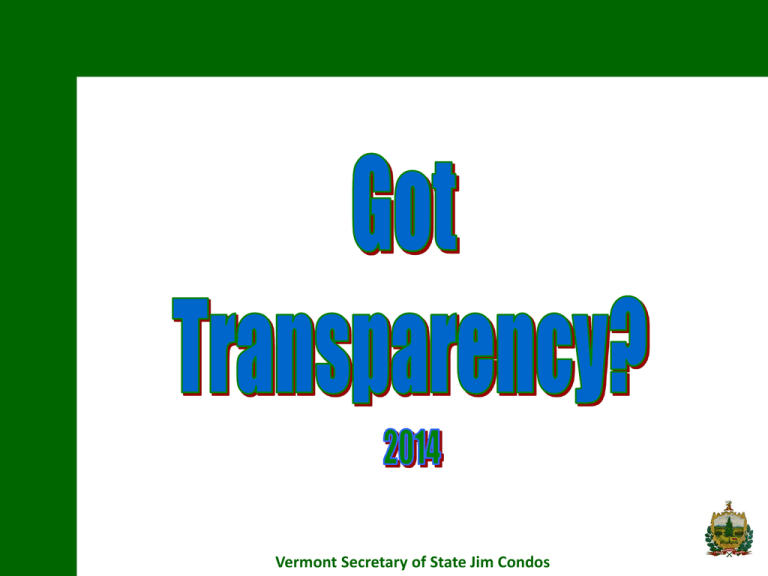
Vermont Secretary of State Jim Condos Why are we here? •Democracy – Accountability – Openness • The public has a right to know! • Comes from the Vermont Constitution. • VT’s open meeting and public records laws are some of our most important because they allow us direct access to the decisions that affect us. • Understanding these laws makes everyone a better citizen. Vermont Secretary of State Jim Condos In Gov’t, the ultimate boss is the public Vermont Constitution Vermont Constitution - Chapter 1, Article 6. That all power being originally inherent in and consequently derived from the people, therefore, all officers of government, whether legislative or executive, are their trustees and servants; and at all times, in a legal way, accountable to them. Vermont Secretary of State Jim Condos In Gov’t, the ultimate boss is the public Vermont Constitution Declarations of public policy 1 V.S.A. § 311. Declaration of public policy . . . public commissions, boards and councils and other public agencies in this state exist to aid in the conduct of the people's business and are accountable to them pursuant to Chapter I, Article VI of the Vermont constitution. 1 V.S.A. § 315. Statement of policy It is the policy of this subchapter to provide for free and open examination of records consistent with Chapter I, Article 6 of the Vermont Constitution. Officers of government are trustees and servants of the people and it is in the public interest to enable any person to review and criticize their decisions even though such examination may cause inconvenience or embarrassment... Vermont Secretary of State Jim Condos What is a “meeting”? •A gathering •of a quorum •of the members of a public body •For the purpose: – of discussing the business of the public body – or for taking an action. (1 V.S.A. § 310(2)) Vermont Secretary of State Jim Condos What is a quorum? • A majority of the entire public body 1 V.S.A. § 172. Joint authority When joint authority is given to three or more, the concurrence of a majority of such number shall be sufficient and shall be required in its exercise. Vermont Secretary of State Jim Condos What is a “public body“? • any board, council or commission of the state or one or more of its political subdivisions; • any board, council or commission of any agency, authority or instrumentality of the state or one or more of its political subdivisions; • or any committee of any of the foregoing boards, councils or commissions. …except that "public body" does not include councils or similar groups established by the governor for the sole purpose of advising the governor with respect to policy. (1 V.S.A. § 310(3)) Vermont Secretary of State Jim Condos What is “discussing business” or “taking action”? • Discussing anything that the public body has the authority to oversee. • Open Meeting laws apply regardless of where a quorum of the public body is gathered Vermont Secretary of State Jim Condos What is not a “meeting”? • “Meeting” shall not mean written correspondence or an electronic communication, including e-mail, telephone, or teleconferencing, between members of a public body for the purpose of: – scheduling a meeting, – organizing an agenda, or – distributing materials to discuss at a meeting. • Provided that such a written correspondence or such an electronic communication that results in written or recorded information shall be available for inspection and copying under the Public Records Act as set forth in chapter 5, subchapter 3 of this title. Vermont Secretary of State Jim Condos Meeting by electronic means • As long as requirements of the open meeting laws are met, one or more of members of a public body may attend a regular, special, or emergency meeting by electronic or other means without being physically present at a designated meeting location. • If one or more members attend a meeting by electronic or other means: • • • • Such members may fully participate in discussing the business of the public body May vote to take an action However, any vote of the public body shall be taken by roll call. Each member who attends a meeting without being physically present at a designated meeting location shall: • identify himself or herself when the meeting is convened; • be able to hear the conduct of the meeting, and • be heard throughout the meeting. Vermont Secretary of State Jim Condos Meeting by electronic means • If a quorum or more of the members of a public body attend a meeting without being physically present at a designated meeting location, the following additional requirements shall be met: o At least 24 hours prior to the meeting, or as soon as practicable prior to an emergency meeting, the public body shall publicly announce the meeting, and o a municipal public body shall post notice of the meeting in or near the municipal clerk’s office and in at least two other designated public places in the municipality. o The public announcement and posted notice of the meeting shall designate at least one physical location where a member of the public can attend and participate in the meeting. o At least one member of the public body, or at least one staff or designee of the public body, shall be physically present at each designated meeting location. Vermont Secretary of State Jim Condos To whom or when does the open meeting law NOT apply? • The judicial branch of the government of Vermont • The public service board • Any public body in connection with a quasi-judicial proceeding • Site inspections for the purpose of assessing damage or making tax assessments or abatements • Clerical work or work assignments of staff or other personnel • Routine day-to-day administrative matters that do not require action by the public body. . . – provided that no money is appropriated, expended, or encumbered. Vermont Secretary of State Jim Condos Meetings & Notices Public must be given notice of the meeting! • Regular Meetings – A public body must adopt a resolution specifying its regular meeting schedule in this instance, – Post an agenda – and provide an agenda on request! • Special Meetings – The time, place and purpose of a special meeting must be publicly announced at least 24 hours before the meeting, – Post an agenda – requires a minimum of 3 public postings AND to each member of the public body. – If the news media has provided a written request for notification of meetings, they must be notified. • Emergency Meetings – Emergency meetings are called to respond to “an unforeseen occurrence or condition requiring immediate attention.” – May be held without public announcement, without posting of notices and without 24-hour notice to members, provided some public notice thereof is given as soon as possible before any such meeting. Vermont Secretary of State Jim Condos Agendas • A meeting agenda shall be posted: o At least 48 hours prior to a regular meeting, and o At least 24 hours prior to a special meeting, • Where? o posted to a website, if one exists, that the public body maintains or designates as the official website of the body; and o in the case of a municipal public body, posted in or near the municipal office and in at least two other designated public places in the municipality. • A meeting agenda shall be made available to any person prior to the meeting upon specific request. • Any addition to or deletion from the agenda shall be made as the first act of business at the meeting. • Any other adjustment to the agenda may be made at any time during the meeting. Vermont Secretary of State Jim Condos Opportunity to be heard! All Public Bodies •The public shall be given a reasonable opportunity to express its opinion on matters considered by the public body during the meeting as long as order is maintained. (1 V.S.A. § 312(h)) •Public comment shall be subject to reasonable rules established by the chairperson. Vermont Secretary of State Jim Condos Minutes Public bodies SHALL take minutes! “The minutes shall cover all topics and motions that arise at the meeting and give a true indication of the business of the meeting.” 1 V.S.A. § 312 (b) • Minutes shall include at least the following: •All members of the public body present; • All other active participants in the meeting; • All motions, proposals and resolutions made, offered and considered, and what disposition is made of same; and •The results of any votes, with a record of the individual vote of each member if a roll call is taken. • Minutes shall be matters of public record, •shall be kept by the clerk or secretary of the public body, and •shall be available for inspection by any person and for purchase of copies at cost upon request after five days from the date of any meeting. Vermont Secretary of State Jim Condos Minutes – new requirement Meeting minutes shall be posted: • no later than five days from the date of the meeting • to a website, if one exists, that the public body maintains or has designated as the official website of the body. Vermont Secretary of State Jim Condos Additional Rights? • Upon request, the agendas of regular or special meetings must be made available to the public or news media prior to a meeting. • News agencies that wish to be notified of special meetings must provide a written request to the public body. • • A written request is good for the rest of the calendar year If the request is made in December, it is good for the next calendar year • Members of the public or news media have the right to attend meetings AND to tape or videotape meetings so long as it is not done in a manner that disrupts the meeting. • The public or news media have the right to know the reason a board is going into executive session. Vermont Secretary of State Jim Condos When can a board meet in private? • A board may only go into executive session • upon a majority vote of the board, • on a motion made in an open meeting, • indicating the reason for going into executive session. • The only permissible reasons for going into executive session are set forth in 1 V.S.A. § 313. • A board may invite into executive session its attorney, administrative staff and persons who are subjects of the discussion or whose information is needed. • No decision may be made in executive session except… • Quasi-judicial decisions may be made in deliberative session so long as there is a written decision that is a public record. Vermont Secretary of State Jim Condos What may be considered in Executive Session? (1) After making a specific finding that premature general public knowledge would clearly place the public body or a person involved at a substantial disadvantage involving: • contracts; • labor relations agreements with employees; • arbitration or mediation; • grievances, other than tax grievances; • pending or probable civil litigation or a prosecution, to which the public body is or may be a party; • confidential attorney-client communications made for the purpose of providing professional legal services to the body; (2) The negotiating or securing of real estate purchase or lease options; (3) The appointment or employment or evaluation of a public officer or employee, provided that the public body shall make a final decision to hire or appoint a public officer or employee in an open meeting and shall explain the reasons for its final decision during the open meeting; (4) A disciplinary or dismissal action against a public officer or employee; but nothing in this subsection shall be construed to impair the right of such officer or employee to a public hearing if formal charges are brought; (5) A clear and imminent peril to the public safety; Vermont Secretary of State Jim Condos More Reasons for Entering Executive Session (6) Discussion or consideration of records or documents excepted from the access to public records provisions of subsection 317(b) of this title. Discussion or consideration of the excepted record or document shall not itself permit an extension of the executive session to the general subject to which the record or document pertains; (7) The academic records or suspension or discipline of students; (8) Testimony from a person in a parole proceeding conducted by the parole board if public disclosure of the identity of the person could result in physical or other harm to the person; (9) Information relating to a pharmaceutical rebate or to supplemental rebate agreements, which is protected from disclosure by federal law or the terms and conditions required by the Centers for Medicare and Medicaid Services as a condition of rebate authorization under the Medicaid program, considered pursuant to 33 V.S.A. §§ 1998(f)(2) and 2002(c). (10) Municipal or school security or emergency response measures, the disclosure of which could jeopardize public safety. Vermont Secretary of State Jim Condos Open Meetings Meetings held without respecting the details of the law may be illegal, and the courts may regard any actions taken in those meetings as voidable. More importantly, illegal meetings offend our notions of: …openness, …accountability, …our democracy. In Vermont, the people rule, sometimes directly, sometimes through elected or appointed representatives, but always with the benefit of public scrutiny. Vermont Secretary of State Jim Condos Are There Penalties? 1 V.S.A. § 314 - Penalty and enforcement (a) A person who is a member of a public body and who knowingly and intentionally violates the provisions of this subchapter, a person who knowingly and intentionally violates the provisions of this subchapter on behalf or at the behest of a public body, or who knowingly and intentionally participates in the wrongful exclusion of any person or persons from any meeting for which provision is herein made, shall be guilty of a misdemeanor and shall be fined not more than $500.00. (b) The attorney general or any person aggrieved by a violation of the provisions of this subchapter may apply to the superior court in the county in which the violation has taken place for appropriate injunctive relief or for a declaratory judgment. Except as to cases the court considers of greater importance, proceedings before the superior court, as authorized by this section and appeals therefrom, take precedence on the docket over all cases and shall be assigned for hearing and trial or for argument at the earliest practicable date and expedited in every way. Vermont Secretary of State Jim Condos Pre-enforcement process • Prior to instituting an action, the Attorney General or any person aggrieved by a violation shall provide the public body written notice that alleges a specific violation of this subchapter and requests a specific cure of such violation. The public body will not be liable for attorney’s fees and litigation costs if it cures in fact a violation. • Upon receipt of the written notice of alleged violation, the public body shall respond publicly to the alleged violation within seven business days by: (A) acknowledging the violation of this subchapter and stating an intent to cure the violation within 14 calendar days; or (B) stating that the public body has determined that no violation has occurred and that no cure is necessary. • Failure of a public body to respond to a written notice of alleged violation within seven business days shall be treated as a denial of the violation for purposes of enforcement of the requirements of this subchapter. • Within 14 calendar days after a public body acknowledges a violation, the public body shall cure the violation at an open meeting by: (A) either ratifying, or declaring as void, any action taken at or resulting from a meeting in violation of this subchapter; and (B) adopting specific measures that actually prevent future violations. Vermont Secretary of State Jim Condos Pre-enforcement process continued • Following an acknowledgment or denial of a violation and, if applicable, following expiration of the 14-calendar-day cure period for public bodies acknowledging a violation, the Attorney General or any person aggrieved by a violation of the provisions of this subchapter may bring an action in the Civil Division of the Superior Court in the county in which the violation has taken place for appropriate injunctive relief or for a declaratory judgment. • An action may be brought under this section no later than one year after the meeting at which the alleged violation occurred or to which the alleged violation relates. • The Court shall assess against a public body found to have violated the requirements of this subchapter reasonable attorney’s fees and other litigation costs reasonably incurred in any case under this subchapter in which the complainant has substantially prevailed, unless the Court finds that: (A) the public body had a reasonable basis in fact and law for its position; and (B) the public body acted in good faith. In determining whether a public body acted in good faith, the Court shall consider, among other factors, whether the public body responded to a notice of an alleged violation of this subchapter in a timely manner under subsection (b) of this section; or (C) the public body cured the violation in accordance with subsection (b) of this section. Vermont Secretary of State Jim Condos Open Meeting Law Questions? Vermont Secretary of State Jim Condos What is a “public record”? • Any written or recorded information, • regardless of physical form or characteristics, • which is produced or acquired in the course of public agency business." (1V.S.A. § 317(b)) Remember! Records Are Not Limited to Paper! All Government Records Are Public Records. Some Public Records are Exempt from Disclosure. Vermont Secretary of State Jim Condos Public records policy 1 V.S.A. § 315. STATEMENT OF POLICY It is the policy of this subchapter to provide for free and open examination of records consistent with Chapter I, Article 6 of the Vermont Constitution. Officers of government are trustees and servants of the people and it is in the public interest to enable any person to review and criticize their decisions even though such examination may cause inconvenience or embarrassment. All people, however, have a right to privacy in their personal and economic pursuits, which ought to be protected unless specific information is needed to review the action of a governmental officer. Consistent with these principles, the general assembly hereby declares that certain public records shall be made available to any person as hereinafter provided. To that end, the provisions of this subchapter shall be liberally construed to implement this policy, and the burden of proof shall be on the public agency to sustain its action. Vermont Secretary of State Jim Condos When can the public inspect and copy? • Any person may inspect or copy any public record of a State agency between 9 AM and 12 PM and 1 PM and 4 PM on any day other than Saturday, Sunday or a legal holiday. (1V.S.A. § 316(a)(1)) • For public agencies of municipalities and other political subdivisions of the State, the right to inspect and copy applies during customary business hours. (1 V.S.A. 316(a)(2)) Vermont Secretary of State Jim Condos You Can Ask, BUT… “The identity and motive of the requestor cannot be considered when weighing access to public documents.” Vermont Supreme Court decision in Shlansky v. City of Burlington and Burlington Police Department 2010 VT 90. Vermont Secretary of State Jim Condos Public Record Exemptions Public agencies are required to produce records for inspection or copying unless the record is exempt from public inspection or copying. While a list of public records exemptions is found in 1 V.S.A. § 317, additional specific exemptions are also found elsewhere in State and Federal laws and regulations. Vermont Secretary of State Jim Condos Public Records Exemptions Examples of commonly exempt records: • personal documents relating to - an individual, - medical information - Social Security numbers • investigations, • trade secrets, • tax records Each agency should know and maintain a compilation of specific State and Federal laws and regulations that affect inspection and copying of records in their custody. Vermont Secretary of State Jim Condos Burden of Proof “The Public Records Act represents a strong policy favoring access to public documents and records. …Exceptions to that general policy of disclosure are listed in 1 V.S.A. § 317(c). We construe these exceptions strictly against the custodians of records and resolve any doubts in favor of disclosure… The burden of showing that a record falls within an exception is on the agency seeking to avoid disclosure.” Vermont Supreme Court decision in Wesco, Inc. v. Sorrell, 2004 VT 102 [internal citations omitted] Vermont Secretary of State Jim Condos Right to Know Database A tool for locating and identifying laws that affect access to VT public records is available on the Secretary of State’s VSARA website… You can search exemptions by agency, exemption type, or through a keyword search at http://vermont-archives.org/records/access/database Vermont Secretary of State Jim Condos Complying with a request • All public agencies are obligated to comply. • Unless otherwise allowed by law, agencies must accept records requests in any manner or format. • An agency may require requests to be made in writing if staff time will contribute to the cost of complying with the request. (1V.S.A§ 316(c)) • Upon receiving a record request, the custodian of the record must promptly produce the record for inspection. (1V.S.A. § 318(a)) Vermont Secretary of State Jim Condos Complying with a request If the record is in active use or in storage and not available for use at the time of the request… • the custodian of the record must certify in writing that the records are not currently available and • establish a day and time, within one week of the request, that the record will be available. (1V.S.A. § 318 (a)(1)) If a record does not exist, the record custodian must certify in writing that the record does not exist. (1V.S.A. § 318 (a)(1)) Vermont Secretary of State Jim Condos Complying with a request • If the record custodian believes that the record is exempt from public access, the custodian of the record must certify in writing what records are exempt and the basis for the denial which exemption applies. • Unless there are “unusual circumstances,” a certification must be made within 3 business days of receiving the request; the custodian of the record must inform the requester that she or he has a right to appeal to the head of the agency. • If the denial of access is appealed and the agency head determines that the record custodian must comply with the request, the records must be made available promptly. (1V.S.A. § 318 (a)(2)) Vermont Secretary of State Jim Condos Complying with a request “Unusual circumstances” means: • The agency cannot comply with the time limits outlined in Public Records Law. • If an agency needs an extension, it must submit a written notification to the individual making the request and specify the reason(s) why and the date when a determination will be made. • Extensions may not exceed 10 business days and are only allowed for the following reasons: (1) the need to search for and collect the requested records from field facilities or other establishments separate from the office processing the request; (2) the need to search for, collect, and appropriately examine a voluminous amount of records; (3) the need for consultation with another agency having a substantial interest in the determination of the request or among 2 or more components of the agency having substantial subject matter interest therein, or with the attorney general. (1V.S.A. § 318(a)(5)) Vermont Secretary of State Jim Condos Access Denied? If access is denied by the record custodian and that denial is appealed to the agency head, the agency head must make a written determination within 5 business days. The written determination shall include: • the asserted statutory basis for denial, and • a brief statement of the reasons and supporting facts for denial. (1 V.S.A. § 318(c)) Vermont Secretary of State Jim Condos More on denial If the head of an agency upholds the denial of a request for records in whole or in part, the agency shall notify the person making such request of the provisions for judicial review of that determination under section 319 of Title 1. (1 V.S.A. § 318 (a)(3)) If the head of the agency reverses the denial of a request for records, the records shall be promptly made available to the person making the request. (1 V.S.A. § 318 (c)) Vermont Secretary of State Jim Condos Narrowing the Request In responding to a request to inspect or copy a record under this subchapter, • a public agency shall consult with the person making the request in order to clarify the request • or to obtain additional information that will assist the public agency in responding to the request • and, when authorized by this subchapter, in facilitating production of the requested record for inspection or copying. In unusual circumstances, as that term is defined in subdivision (a)(5) of this section, a public agency may request that a person seeking a voluminous amount of separate and distinct records narrow the scope of a public records request.” (1 V.S.A. § 318(d) as added by Act No. 59 of 2011) Vermont Secretary of State Jim Condos Redacting Exempt Information It has always been best practice, whenever possible, to redact exempt information and provide the remainder of a document. NOW it is mandated by statute: “A public agency shall not withhold any record in its entirety on the basis that it contains some exempt content if the record is otherwise subject to disclosure; instead, the public agency shall redact the information it considers to be exempt and produce the record accompanied by an explanation of the basis for denial of the redacted information.” (1 V.S.A. § 318(e) as added by Act No. 59 of 2011) Vermont Secretary of State Jim Condos Mandatory Attorney Fees Under prior law… judges had the option to make the State (or a municipality) pay the attorney and other legal costs of a party who successfully challenged an agency denial – but such impositions of fees against agencies were more the exception than the rule. Under new and current law… judges are required, except in narrow exceptions, to make an agency pay attorney and other legal costs to a successful challenger. (1 V.S.A. § 318(d) as added by Act No. 59 of 2011) Vermont Secretary of State Jim Condos Do I have to gather new information or create documents in order to respond to a records request? No! A requestor cannot obligate the government to create a record which is not already in existence or required by law. Vermont Supreme Court decision in Welch v. Seery, 138 Vt. 126, 129 (1980) Vermont Secretary of State Jim Condos Agencies may charge to create documents that don’t yet exist If an agency receives a request for a record that does not already exist, and is willing and able to develop the requested information, it may charge for that undertaking. It should provide an estimate of the charges in writing in advance, and may require payment before it commences the effort. (1 V.S.A. § 316(c)(2)) Vermont Secretary of State Jim Condos Fees for copies of public records Agencies’ fees for copying of public records must follow standards that are established by law. Absent any particular statutory fee, public agencies must establish fees based on what is allowed by 1 V.S.A. § 316. Agencies may only charge and collect from the public the actual cost of providing the copy, including mailing or transmission. Staff time for complying with a public record request may not be charged or collected unless: • Staff time directly involved in complying with the request exceeds 30 minutes; • The agency agrees to create a new record; or • The agency agrees to provide the record in a non-standard format and the staff time involved exceeds 30 minutes. Upon request, an agency must provide an estimate of the charge. The agency may request that any requests subject to staff time charges be made in writing and that all charges be paid prior to delivery. Receipts must be provided. Vermont Secretary of State Jim Condos Uniform schedule of public record charges for state agencies 1 V.S.A. § 316: the Secretary of State is mandated to establish the actual cost of providing a public record that may be charged by state agencies. The Secretary of State is also required to establish the amount that may be charged for staff time. The Uniform Schedule of Public Record Charges for State Agencies may only consider the following factors set forth in 1 V.S.A. § 316(d): – The cost of the paper or the electronic media onto which a record is copied; – A prorated amount for maintenance and replacement of the machine or equipment used; and – Utility charges directly associated with copying a record. Vermont Secretary of State Jim Condos Are There Penalties? 1 V.S.A. § 320. Penalties (c) A person who willfully destroys, gives away, sells, discards, or damages a public record without having authority to do so shall be fined at least $50.00 but not more than $1,000.00 for each offense. Vermont Secretary of State Jim Condos Vermont Secretary of State Jim Condos Please call or visit our office with any questions! James C. Condos Vermont Secretary of State 128 State Street Montpelier, VT 05633-1101 www.sec.state.vt.us 802-828-2363 Vermont Secretary of State Jim Condos
